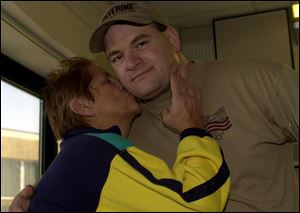
Son gives life back to his mother
12/13/2002
Rosalie Miller gives her son, Todd, a kiss at Medical College of Ohio Hospitals. Todd donated one of his kidneys to his mother with the help of a city benefit that gives employees six weeks off with pay when they donate an organ.
Todd Miller is a Toledo police officer, and he's expected to put his life on the line to save others, if he must.
On Dec. 5, traffic Officer Miller did just that.
He voluntarily had his left kidney removed at Medical College of Ohio Hospitals. He felt he must.
In a nearby operating room was his mother, Rosalie Miller.
There, a doctor removed her left kidney, a 58-year-old organ ruined by high blood pressure and diabetes. He put Todd's healthy one in its place.
On Monday, Officer Miller went home. Tuesday, his mother did too.
“Right away, that kidney just took off working,” Mrs. Miller said. “My own kidneys quit two years ago. I've been on dialysis. It feels strange now, but wonderful. Going to the bathroom. Feeling thirsty. And my appetite! I'm scarfing up everything I can get into my mouth.”
Her son smiled at her. “She gave me life. That included two kidneys,” he said. “I just gave her one back.”
Kidney transplants are not unusual. MCO is the only hospital in the region that offers such transplant surgery. Its doctors performed 24 kidney transplants this year, Transplant Coordinator Susan Schwartz said.
Unlike hearts, eyes, lungs, and livers, which come from cadavers, donors can live healthy lives after they give up a kidney, Ms. Schwartz said.
So far as anyone knows, Mr. Miller was the first patient covered under the city's Organ Transplant Donation ordinance. The law, passed unanimously by council in November, 2001, gives city employees up to 30 days of paid leave when they donate a kidney, and seven days if they donate bone marrow.
“It really encourages people to donate organs,” Ms. Schwartz said. “We see so many people dying while on waiting lists - donations were down 40 percent last year. Anything an employer can do to make this easier, we're all for it. The city did a great thing.”
Toledo is not alone in its organ-donor support. State employees receive similar benefits, and Northwood and Oregon councils approved them for their employees. There's very little risk of malingerers taking advantage, Mr. Miller said. Pre-operative tests and screenings can take months to complete. No surgery is risk-free.
“I'd built up enough sick days to do this on my own time. But with the ordinance, it's just a lot less strain and worry,” he said. “I'm moving pretty slow, but I'm going to be fine. It just hurts a little,” he said. “The kidney? I don't miss it.”
Ms. Schwartz said Mr. Miller will feel fine in a couple of weeks, but should avoid chasing suspects and other strenuous work for at least a month.
Mrs. Miller, a sometime waitress and factory worker, can get back to work in six weeks or so, and will have to swear off grapefruit juice and shellfish, which might interfere with medicines she must take. No lobster dinner celebrations for her. “That's OK. I just like regular food,” Mrs. Miller said. “Lots of it! It's so strange, having an appetite again. And no more dialysis!”
Amy Miller, the police officer's wife, said she considers Todd a hero.
“Look what he's done,” she said. “He's saved a life. To me, he's even more of a man.”